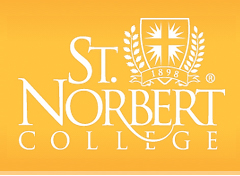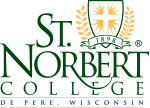About St. Norbert College
Founded in 1898, St. Norbert College is a top-ranked Catholic liberal arts college in De Pere, Wis. As the only Norbertine higher education institution in the world, SNC draws from a rich background of the Catholic, Norbertine and liberal arts traditions to foster intellectual, spiritual and personal development of its students, staff and faculty. Learn more Learn more.
Launch of Digital Commons @ St. Norbert College
In 2015 converging interests and needs aligned to bring together a group of individuals, both faculty and staff, from across campus ready to champion the value and potential of an institutional repository, and ultimately to select bepress as the platform for Digital Commons @ St. Norbert College.
The repository continues to grow into an invaluable resource as areas across campus are introduced to its potential and how it can fit into their communication needs.
The Founding Members of the Advisory Group
- Sarah Titus, Librarian for Archives and Special Collections
- Rosemary Sands, Assistant Director, Center for Norbertine Studies
- Reid Riggle, Associate Professor and Co-Chair, Teacher Education
- John Pennington, Professor of English
- Daniel Lynds, Instructional Technologist for Digital Humanities
- Sally Cubitt, Coordinator of Collection Management & Archivist, Mulva Library
- Kristin Vogel, Director, Mulva Library
- Susan Allen, College Editor, Office of Communications
- David Bailey, Professor of Biology
- Rachel Mueller, Communications Specialist, Mulva Library
The digital commons advisory group is made up of members from across all of campus.
For any questions contact anyone on our current advisory group:
- Sarah Titus, Librarian for Archives and Special Collections
- Rosemary Sands, Assistant Director, Center for Norbertine Studies
- Reid Riggle, Associate Professor and Co-Chair, Teacher Education
- John Pennington, Professor of English
- Kristin Vogel, Director, Mulva Library
- Susan Allen, College Editor, Office of Communications
- Rachel Mueller, Communications Specialist, Mulva Library
- Charles Jacobs, Professor of Political Science
About Institutional Repositories
Growing robustly since 1999, institutional repositories represent a shift to embrace and adapt to 21st-century needs. Since digitally-born materials now represent the bulk of intellectual and organizational output, we must build into the community a process for preserving, accessing and engaging those items as past practices for archiving and publishing are becoming increasingly less relevant and less sustainable. Clifford Lynch, director of the Coalition for Networked Information has explained, “A university-based institutional repository is a set of services that a university offers to the members of its community for the management and dissemination of digital materials created by the institution and its community members. It is most essentially an organizational commitment to the stewardship of these digital materials, including long-term preservation where appropriate, as well as organization and access or distribution. While operational responsibility for these services may reasonably be situated in different organizational units at different universities, an effective institutional repository of necessity represents a collaboration among librarians, information technologists, archives and records managers, faculty, and university administrators and policymakers.”
Because of this shift in higher education, we believe Digital Commons is positioned to be strategically valuable to St. Norbert College in two key areas: a singular interface which (1) captures and displays the intellectual capital of the college – whether in scholarly and creative works, administrative reports, events and more – and (2) demonstrates and develops St. Norbert’s participation in an important emerging alternative paradigm for scholarly communication. For an excellent overview, see the Raym Crow’s case for institutional repositories prepared for the Scholarly Publishing and Academic Resources Coalition (SPARC).

